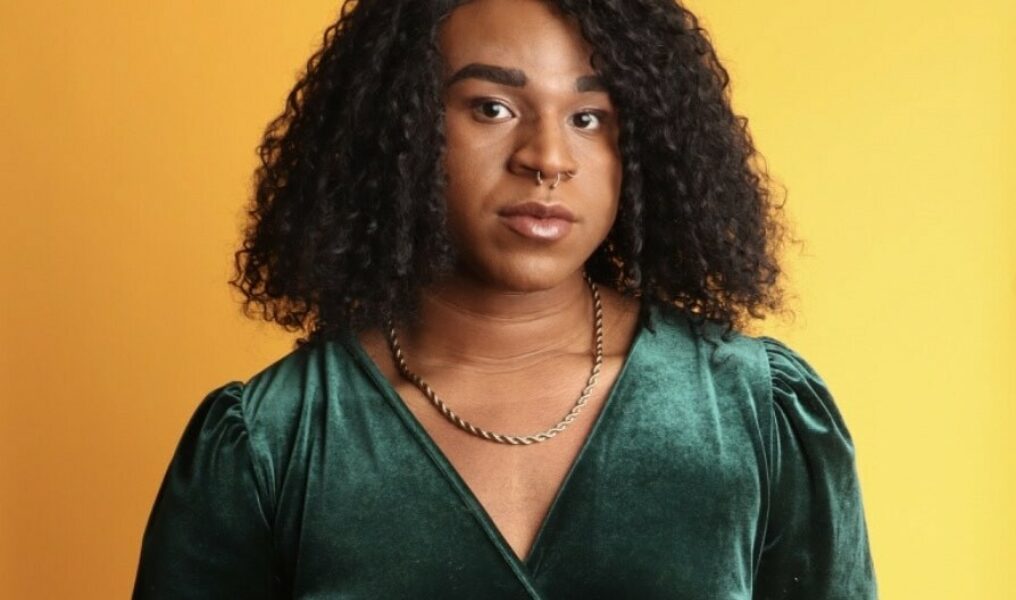Performing Her Original Music at Pride Is a Dream Come True for This Trans Michigan Artist
Baddie Brooks headlines Ferndale Pride on June 3

Playing the Tin Man in an elementary school production of “The Wizard of Oz” was just the beginning of Detroit-born artist Baddie Brooks’ performance career, which, it seems, is about to take off in a big way. Brooks is set to perform at two local Pride fests in June and is working toward the release of her debut album, “Reclamation.”
Brooks caught the music bug early, performing with her middle and high school bands and choirs, but it was her time as an undergraduate student at Eastern Michigan University (EMU) when she truly started to shine through with solo shows at campus events.
Brooks’ time at EMU was pivotal on a personal level, as well. It was during her final year there, in 2021, that she was finally able to come out as transgender. Brooks now uses they/them and she/her pronouns, and does sometimes identify as a trans woman, but feels most comfortable with the term “trans femme.”
“I would say that my time at EMU for me was very transformative. I feel like I made a lot of connections, specifically with being able to perform,” Brooks tells Pride Source. “EMU also helped me become more confident with doing solo performances.”
Brooks' performances incorporate her many talents, including songwriting, singing and playing the trumpet and euphonium, while the music itself leans heavily on R&B, pop and house. Brooks’ stage presence as a multi-hyphenate will bring fresh style to the stage when she closes out Ferndale Pride on June 3.
“We’re particularly excited about Baddie Brooks because of her voice and her talent on the trumpet,” says Julia Music, executive director and co-founder of Ferndale Pride. “I think this summer is really just going to propel her forward to where she needs to be, so that’s really the exciting thing — having this person who has so much talent close out the stage and get a big spotlight on her.”
Brooks hopes that’s the case, too. Her goal is to inspire audiences at all of her upcoming shows, including Ypsilanti Pride on June 2.
“My performance is going to be very lively, the energy is going to be very high,” she says. “I feel like people are definitely going to be able to dance. And it's going to be very upbeat and uplifting. I literally dreamt of performing at Pride and performing my own songs at Pride since I was a teenager, so to be able to do this is a dream come true in itself because I just never thought I was going to be able to come out and do this.”
Through the most difficult times in Brooks’ life, music has been a constant avenue of expression.

“I would say throughout my life it wasn't easy not being able to grow up as myself,” Brooks says. “Music was always there as my comfort. I want to continue to create this album because I know I'm not the only person in that position.”
“Reclamation” has been in the works for five years, and her goal with the album is to encourage people to proudly claim who they are. The three singles Brooks has already released have given listeners a glimpse into this theme. R&B ballad “Telepath,” pride-packed pop song “Gworlz and Gayz” and transgender dance anthem “Buss Down Wig” all represent her expansive stylistic range as a musician and demonstrate her progression as an individual.
“I just feel like the different singles definitely reflect different stages of growth,” Brooks says. “The first single ‘Telepath’ definitely describes how I was before coming out. I was actually very shy, and that song is about wanting to approach a guy but wanting him to read [my] mind and just being too scared.”
Brooks says the second single “Gworlz and Gayz” encompasses a “celebratory moment” of how she felt when she was able to celebrate her first Pride, while “Buss Down Wig,” which was released alongside a music video filmed in Gigi’s in Detroit, focuses on the beauty of coming into yourself.
As she just started taking songwriting more seriously the last two years, Brooks says “Reclamation” will show her progression through the music, showcasing her experiences both before and after coming out. One song on the album, “13 Years,” signifies the amount of time, from ages 8 to 21, that Brooks had to repress who she truly is.
“In the fourth grade, I used the name ‘Demetra’ and temporarily felt like I was living authentically when I was in elementary school,” she says. “Once I began to hide my feminine persona out of concern for my own safety, it felt like I wasn’t living as my true self. My fellow students noticed that I was living a double life. I unfortunately began to hide that part of myself due to the pressure and discrimination I experienced from individuals who are not accepting of LGBTQIA+ identities.”
Throughout her time in college, the artist says that the feeling grew more intensely, especially during Covid lockdown. “Having so much time to reflect on my personal identity made me realize that I could no longer hide, which I feel like many queer and trans people experienced during the Covid pandemic,” Brooks says. “I did not get to come out until I was almost 22 years old during my last year at Eastern Michigan University.”

Music has allowed Brooks to express herself in a way she didn’t have the chance to when she was younger. Now, she can show other members of the LGBTQ+ community that they can be comfortable being their true self too.
“Black trans women deserve to be loved and protected,” Brooks says. “People need to take the time to actually get to know us as people. Violence or bias against us is unacceptable and disgusting.”
The tragic fact is that transgender women of color disproportionately experience violence. In Michigan, the Elliott-Larsen Civil Rights Act has recently been expanded to further protect LGBTQ+ residents from discrimination in employment, public services, housing and educational facilities.
Across the country though, trans rights are being targeted by anti-LGBTQ+ legislators, and according to the American Civil Liberties Union, there are currently 474 anti-LGBTQ bills pending in state legislatures across the country. Brooks expressed her feelings on the current political climate in the country.
“LGBTQIA rights need to be protected at all costs,” Brooks says. “We deserve to be safe, and should not be targeted for just being who we are. I think that it's important to highlight the successes of transgender people.”
Performing during Pride events is just one way Brooks' success will be highlighted and she hopes her performances and upcoming album will inspire other young queer people in the community.
“My music is meant to tell a story,” Brooks says. “I really want to continue empowering queer folks in general and letting them know that they deserve to be celebrated and to embrace who they are.”
Brooks is set to perform at Ypsilanti Pride June 2 and Ferndale PrideJune 3. The performer is raising funds to support the release of “Reclamation.” Visit bit.ly/42Z3FCe to contribute.









